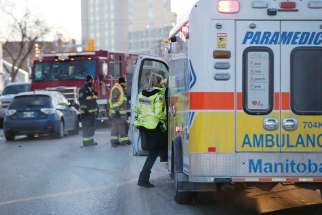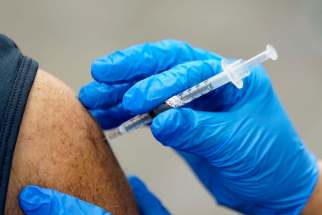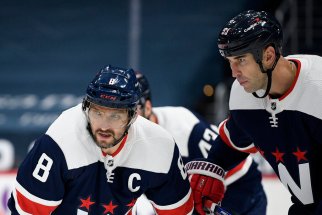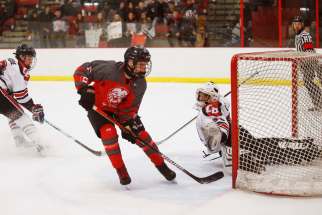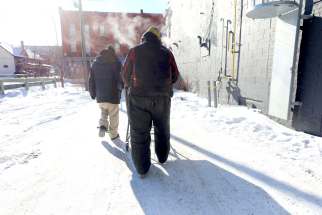COVID running up the score on some U.S. NHL teams
Read this article for free:
or
Already have an account? Log in here »
To continue reading, please subscribe:
Monthly Digital Subscription
$0 for the first 4 weeks*
- Enjoy unlimited reading on winnipegfreepress.com
- Read the E-Edition, our digital replica newspaper
- Access News Break, our award-winning app
- Play interactive puzzles
*No charge for 4 weeks then price increases to the regular rate of $19.00 plus GST every four weeks. Offer available to new and qualified returning subscribers only. Cancel any time.
Monthly Digital Subscription
$4.75/week*
- Enjoy unlimited reading on winnipegfreepress.com
- Read the E-Edition, our digital replica newspaper
- Access News Break, our award-winning app
- Play interactive puzzles
*Billed as $19 plus GST every four weeks. Cancel any time.
To continue reading, please subscribe:
Add Free Press access to your Brandon Sun subscription for only an additional
$1 for the first 4 weeks*
*Your next subscription payment will increase by $1.00 and you will be charged $16.99 plus GST for four weeks. After four weeks, your payment will increase to $23.99 plus GST every four weeks.
Read unlimited articles for free today:
or
Already have an account? Log in here »
Hey there, time traveller!
This article was published 12/02/2021 (1760 days ago), so information in it may no longer be current.
Boy, how about the thrilling, non-stop NHL action Thursday night? Let’s roll the highlights:
Down in Denver, you had the high-flying Colorado Avalanche hosting the Arizona Coyotes. Well, on paper, anyways. The actual on-ice product was postponed. OK, let’s head to the State of Hockey to see how our old Central Division friends fared, as Minnesota entertained St. Louis. What’s that? Scrapped as well. Huh.
Surely things are a bit better on the East Coast. Were the Buffalo Sabres able to contain Alexander Ovechkin and the Washington Capitals? Turns out their inability to contain something else meant this one was also shelved. At least there’s that Flyers-Devils clash in Philly, right? Wrong.
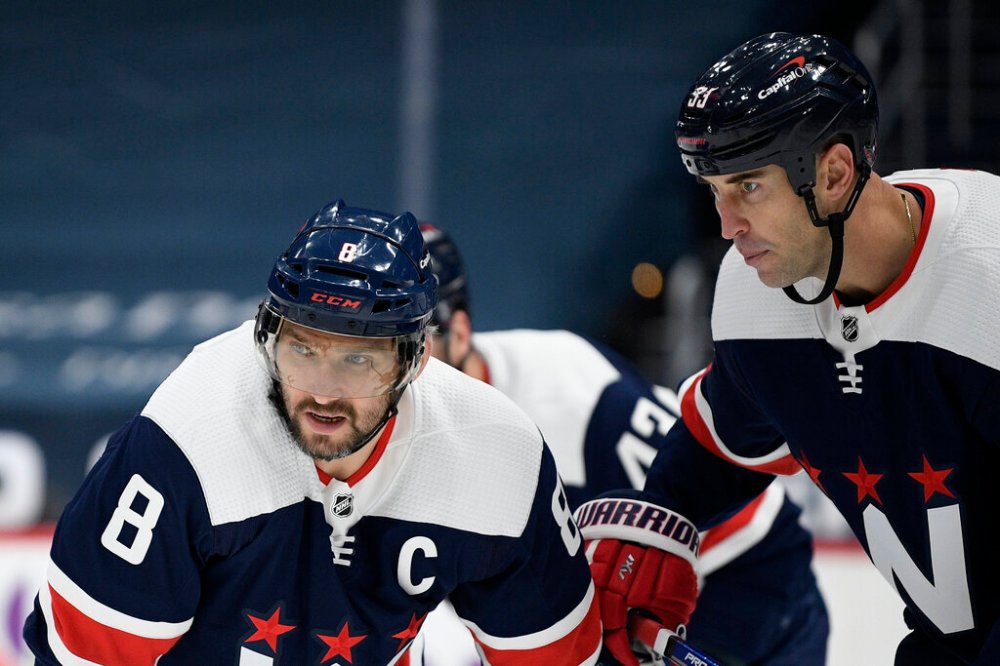
Oh, for Pete’s sake.
Yes, COVID-19 is running wild right now through several teams south of the border, with a couple recent scares of our own here in Canada. There are at least 59 players currently on the league’s pandemic-related “unable to play” list, with five clubs on pause due to major outbreaks.
Desperate times call for desperate measures, and the NHL has made changes to the health and safety protocols players must follow, effective immediately, in an attempt to flatten its ever-expanding curve.
And so on the same weekend Manitobans can finally start enjoying some long-lost luxuries to everyday life — be it dining at a restaurant, sweating out the stress at the gym or getting a much-needed manicure — the local hockey club is heading into a more restrictive form of lockdown.
The most notable tweak is what amounts to mandatory house arrest, save for going to games and practices, individual outdoor exercise or emergencies. Things like grocery shopping and dining should now be done by delivery only. Family members have also been told to follow a similar routine, which is going to be especially difficult for those with school-age children.
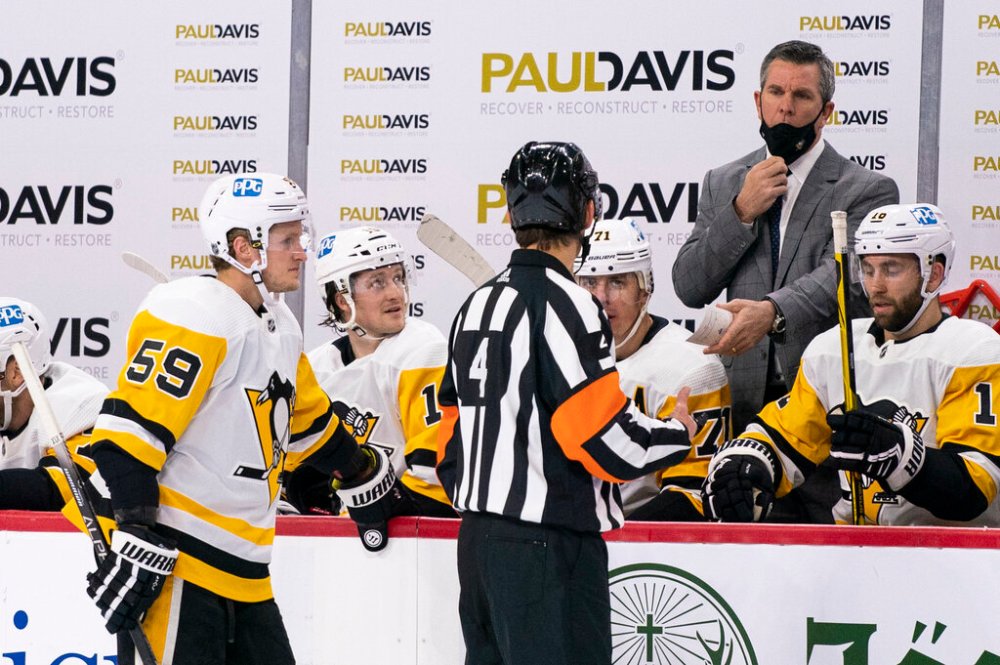
There will be increased testing of family members to “identify potential sources of player infection before transmission can occur.” All team meetings must be done online, rather than in person, and players have been told to spend “no extended time” with each other away from the rink. And masks are mandatory at all times except when skating, sitting on the bench or working out.
This is the closest thing to the bubble environment players were in last summer for the Stanley Cup playoffs, but balked at for an entire season. Now, it appears, they have no choice if they want this unique season to continue.
“It kind of is what it is. We’re all doing our part to make sure that we can play hockey and play safely and not be a risk to the community and not put ourselves at risk or our teammates at risk. Just trying to do everything possible to play hockey. Everyone’s kind of making sacrifices for the betterment of the league,” Jets forward Andrew Copp told me Friday.
A game-changer in some cities, where players have had all kinds of freedoms to come and go, until now. But a necessary one to try and bend the COVID-19 curve. After all, the virus has clearly made its way from the community into the dressing room in multiple markets, so the door must be slammed shut as tightly as possible.
Copp was on the NHLPA bargaining committee that hashed out return-to-play protocols with the league. He was angered a couple weeks ago when the NHL announced the first wave of new rules, which included telling players they can only come to the rink a maximum of one hour and 45 minutes before a game. The league backed down on that one later in the day. He wasn’t nearly as vocal about these additional changes.
“… we’re doing everything possible. Our mask wearing has been very, very good. I don’t know if I’ve seen one guy not wearing a mask when he should be.”
– Andrew Copp
“First off, you can do everything right and still end up getting someone contaminated with the virus and things can spread. Nothing’s foolproof, nothing’s 100 per cent. But I will say — and I think this is part of why I was adamant about the time at the rink before the games — we’re doing everything possible. Our mask wearing has been very, very good. I don’t know if I’ve seen one guy not wearing a mask when he should be,” said Copp.
“We’re spacing out in the gym, we’re spacing out in the locker room, we’re very, very conscious and very aware of it. We haven’t had restaurants and stuff to go to, so there really hasn’t been much activity away from the rink where we put ourselves at risk.”
Winnipeg had an early COVID-19 scare when defenceman Tucker Poolman, much to his surprise, tested positive Jan. 15, less than 24 hours after playing in the home-opener against Calgary. He was immediately isolated for two weeks, but only gave the virus to his fiancé.
Somehow, no other Jets got sick. Teams in Buffalo, New Jersey, Minnesota, Colorado and Philadelphia, which are all dealing with big outbreaks right now, can only wish they were so fortunate.
The NHL is finally addressing a major loophole by adding PCR testing to its arsenal, which can help identify potentially positive players before they hit the ice for a game that same night. Currently, only 24-hour tests have been administered. That delay is being blamed for the Devils taking on the Sabres in a recent weekend series that turned into a super-spreader event, and a similar three games over four nights between the Wild and Avalanche.
Thursday night’s contest between Edmonton and Montreal was pushed back by an hour because Oilers forward Jesse Puljujarvi was put in protocol earlier in the day, and officials put both clubs through PCR testing to ensure no other positives before the puck could drop.
There’s also an additional study being done with regard to contact tracing and even genome sequencing of players who have tested positive to identity potential other strains of the virus now making their way into North America. And the league has also told teams that players who have recovered from COVID-19, such as Poolman, must be used as “buffers” in seating arrangements within dressing rooms and on team buses and airplanes.
“Evidence is emerging that individuals appear to have at least some protective immunity to re-contracting the COVID-19 virus for at least 90 days after their initial infection,” the NHL said in a statement. “For example, a player who tested positive less than 90 days previously should be seated next to a player who has never had COVID-19, or who has recovered from COVID-19 more than 90 days previously.”
A case of too little, too late? Time will tell. But with these added measures now in place, the hope is the focus can soon shift back to where the NHL wants it — the on-ice action.
mike.mcintyre@freepress.mb.ca
Twitter: @mikemcintyrewpg

Mike McIntyre grew up wanting to be a professional wrestler. But when that dream fizzled, he put all his brawn into becoming a professional writer.
Our newsroom depends on a growing audience of readers to power our journalism. If you are not a paid reader, please consider becoming a subscriber.
Our newsroom depends on its audience of readers to power our journalism. Thank you for your support.

